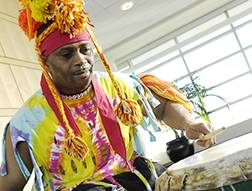Liberia Legend of Drum and Music
Introduction
 In the old days, long, long ago, when the sky was forced to divide the sun and earth over a village, while everyone was asleep there was lightening and thunder and its thunderous flash brought down a galaxy of musical instruments: drums, horns, flutes, sasas, xylophones, stringed instruments, and so forth. Per the strange musical instruments, as they suddenly descended from the heavens and landed where the villagers fetched their drinking water, the flashes of lightening turned the early morning dew into broad day.
In the old days, long, long ago, when the sky was forced to divide the sun and earth over a village, while everyone was asleep there was lightening and thunder and its thunderous flash brought down a galaxy of musical instruments: drums, horns, flutes, sasas, xylophones, stringed instruments, and so forth. Per the strange musical instruments, as they suddenly descended from the heavens and landed where the villagers fetched their drinking water, the flashes of lightening turned the early morning dew into broad day.
Early that morning, the women of the village who went to fetch water were very surprised to see an assortment of very strange objects at the banks of the river. The women were being marveled and very sympathetic at the objects in asking what their names were. “Beat us and we will speak our names” the galaxy of drums responded. We cannot beat object that has done us no wrong, so let us be sincere and say, “Only wrong doer deserves beating”. “Please, don't be afraid of us. Beat us! We would like you to know that we have not done anything wrong. We have done nothing to be ashamed of. We have committed no crime. We have done nothing to feel sorry about. These are not only our opinions. This is also the opinion of the whole world. Beat us!
Unimpressed and unmoved by the “talking drums’ request, the women enthusiastically run back to the village to the waiting feet of the elders to inform them about the wonders they had seen. “Go see!” they said, “there are some very strange objects down the water front!” Swiftly the elders followed the road to the waterside to find out what had descended upon their peaceful village.
The first elder named Sene or “Secret Glove” of the Bassa kingdom picked up a drum from among the strange musical instruments. He pounded on the drum and it made a loud sound: dum! dum! dum! and the sound of the drum towered the village. The second elder, Tu Flann, of the Grebo kingdom picked up one of the strange air instruments, a flute, and he played it: boo, boo, boo, high above the village it towered. The third elder named Taaninggi or “Talking Drum” of the Bandi kingdom picked up another strange instrument, this time a xylophone and he hit on its keyboard and pon, pon, pon, came forth and engulfed the village.
The fourth elder Togbeh or “War Drum” of the Krao kingdom picked up one of strange drums and pounded the drum tapped boom, boom, boom, its “talking” towered the village. The fifth elder Samba or “Small Talking Drum” of the Dei (Guwion) kingdom picked up one of strange drums and pounded the drum tapped kpaan, kpaan, kpaan, its tonal sound echoed the village. The six elder Tardegai of the Loma Kingdom picked up one of the strange drums and pounded and it tapped a solid "thump, thump, thump" rang over the village. The seventh elder Kpolui saw several round instruments, which came in various sizes. He played one of them holding the ropes at the top with one hand, holding the bottom of it with the other hand, and shaking it and it went cha-cha cheke-che.
And so it was that the ceili built as elder after elder of the Ndoli Jowei Kingdom of the Mende, Gba of the Krahn Kingdom, and the list of other elderstook their time to beat and struck the drum kits a variety of handheld implements including sticks, mallets, and brushes. And each drum struck named itself after the drummer. This is how drum got their names!
As the instruments were being played, their harmonious sounds went right up to the celestial axis at the top of heaven that woke up the God. After the task of drums and instrument trials had been completed, the feast progressed: wusa or acrobatic dance, hunter dance, communal dance, competitive dance, masquerade dance, morning greeting song, chiefs procession dance, initiation rites, weddings, title-taking ceremonies dances, funeral dance, and ceremonies for the Ancestors dances. And so it was that the people sang and danced. Very soon a long queue formed and everyone joined their "line dance." In the moonlight, they danced back and forth — about 5 feet left and then about 5 feet right — back and forth in loop.
The Vai began to sing their song, and they danced in Vai. Then the Mandingo sang, and they danced in Mandingo. Then the Mahn, too they sand and danced in Mahn. Then Loma would be outdone! The settlers too dance the “Liberia Grand Dance”. They danced and sang showing joy or happiness in Loma. Oh, the Bassa, Dahn, Wee, Kuwaa, Mende, Kissi, Sarpo, and Krao felt the vibration so they sang and danced in their “line dance”. As the sweeping watched over them the chorus led to a frenzied dance--rhythmic foot-stamping, harmoniously shaking the shoulders-back - bottom-clap-clap-clap-clap-clap. Everyone got actively involved simultaneously, playing different instrument, dancing, singing, hand-clapping, observing, or commenting as the dancer musically emphasized their upper body, and torso to the call-and-response singing.
Legend had it that these elders are among the living dead even to this day as their story drumming and singing continues to amuse the human souls. When their samba rumbles, all legs, including those of the elders and the youth, tremble. Its sound makes the hard-working farmers lose their cutlasses and young women miss their door.

